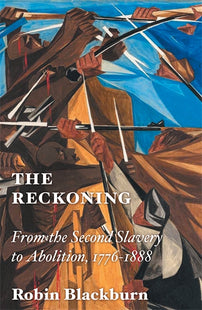The Reckoning: a Letter from the Editor
Part of our March Verso Book Club reading.

Robin Blackburn’s The Reckoning is a remarkable history of the rise and fall of plantation slavery in its three nineteenth-century strongholds: the US South, Cuba and Brazil. In 1800 there were 2.3 million slaves in the Americas; by 1860 there were 6 million. Slavery surged despite the advance of abolition of several fronts: the Haitian Revolution, the ending of the Atlantic slave trade by major carriers (to much self-congratulatory fanfare by the British) and the withering of slavery in Latin American republics, British colonies in the Caribbean and the northern United States. ‘The institution of slavery demonstrated an ability to mutate and evolve new forms, securing survival and seizing new commercial opportunities in the jaws of revolutionary events which could have swallowed them whole,’ Blackburn writes.
The Reckoning explores slavery’s racist logics, capitalist avarice and human toll. The book’s scope is one of the more remarkable things about it, covering not only the cotton belt in the US South but also in equal measure the coffee plantations of Brazil and sugar farms of Spanish Cuba – while also disentangling the history of the polities that housed these remorseless slave regimes.
In two earlier books that can now be found in Verso’s World History series, The Making of New World Slavery (1997) and The Overthrow of Colonial Slavery (1988), Blackburn traced the creation of slavery in the Americas and its abolition in the British, French and Spanish empires, covering the years to 1848. In between The Making and The Reckoning he penned two major works on modern pensions, Banking on Death and Age Shock. He has also produced in The American Crucible a thematic analysis resuming the whole span of slavery and its after-effects in the Americas, from the 16th to the 21st centuries. Writing in the Nation, Eric Foner has hailed him as ‘one of the foremost scholars of slavery as an international institution’.
In the end, of course, abolitionism caught up with and overcame plantation slavery, though as Blackburn explores in a chapter on Reconstruction and in the Epilogue, not without much unfinished business. The defeat of the Confederacy was the decisive event in slavery’s overthrow, destroying the most formidable of the slavery-upholding states. Blackburn shows how abolitionism was the proximate trigger for the Civil War, straining the bonds of Union. ‘In the absence of a militant anti-slavery movement,’ he argues,
and without the rise of a political party dedicated to at least some of its objectives, it must be doubted whether there would have been a Civil War. Even if war had somehow broken out, it would have been unlikely to culminate in emancipation. Purely economic differences between North and South could have been patched up through compromise. The differences over slavery were so deep because a significant sector of northern opinion not only opposed slavery, but came to believe that slave-holders should be held in a sort of moral and political quarantine. The slave-holders had, as it appeared, a ready-made escape route in Secession, and they took it.
‘The Reckoning’ of the title bears several meanings, he explains: financial calculation, political nemesis and moral responsibility for slavery – an institution Du Bois termed the ‘foulest and filthiest blot on nineteenth-century civilisation’.
Tom Hazeldine, Editor at large
London, January 2024
The Reckoning: From the Second Slavery to Abolition, 1776-1888 by Robin Blackburn is one of our March Verso Book Club options. Learn more about the Verso Book Club.
[book-strip index="1" style="buy"]
